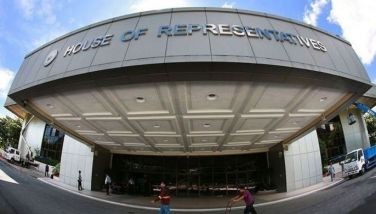Chemical attack survivor recounts ordeal
March 20, 2003 | 12:00am
As Iraq braces for war again with the United States, thousands of Kurds in northern Iraq — who are opposed to Iraqi leader Saddam Hussein — have fled their homes, fearing chemical weapon attacks.
They well know the price of defying the dictator and have only one word that strikes fear into their hearts: Halabjah.
In the morning of March 16, 1988, Iraqi warplanes bombed the Kurdish town of Halabjah in northern Iraq, just a few miles from the Iranian border.
At first the Iraqis used conventional bombs. But at around 5 p.m., they switched to chemical weapons. By the time Halabjah’s residents realized it, they were breathing poison, survivors recalled in chilling detail.
About 5,000 people were killed in one day alone and at least 7,000 were injured. Other reports said 10,000 were injured.
"Most of the people were vomiting. There were hundreds of corpses around us... Our skins were burned and blackened," one woman said in a videotaped interview taken by Kurdish resistance.
The 24-minute video, which was smuggled out, was furnished to The STAR yesterday by the US Embassy.
The yellowish footage showed streets devoid of life that made Halabjah look like a ghost town. Bodies — including that of a woman lying face down on top of a baby she tried to protect — littered the roads.
"It was on Wednesday evening... when the Iraqi regime, through its military planes, sent chemicals holding black death as gifts to the people of Halabjah," the tape’s narrator said.
As the bombing became heavier, a woman who survived the attack said many residents hid in cellars that offered no protection against poison gas that slowly enveloped them.
"On our way out we saw lots of sick people and animals with swollen tongues. We stayed in nearby villages for two days, hoping that the poison gas attack would stop, but the bombardment intensified, hour after hour, day after day," she said.
"We suffer from poor vision. Our skins were burned and black. When one of my daughters left the hospital, she was so disfigured that even her father could not recognize her," said another woman, who lost her parents and her siblings. "Her hair was all cut, her eyes were dislocated, and she said she was his daughter. He denied it."
That is, until he read a piece of paper the girl was carrying that had her name on it and recognized her handwriting.
The same woman added that she found a girl — likewise badly disfigured by chemical burns — in the hospital were she received treatment. Three days later, she learned that the girl was her niece.
The attacks will be felt for generations in the form of cancer or birth defects, said British doctor Christine Gosden, who secretly traveled to northern Iraq to study their effects.
In his address to the American people on Monday, US President George W. Bush argued that Iraq had to be disarmed — peacefully or by force — before Saddam Hussein could provide chemical weapons to terrorists who have made earlier threats to "kill thousands or hundreds of thousands of innocent people in our country, or any other."
"Instead of drifting along toward tragedy, we will set a course toward safety," Bush said, referring to his ultimatum for Saddam to go into exile or face war. "Before the day of horror can come, before it is too late to act, this danger will be removed."
They well know the price of defying the dictator and have only one word that strikes fear into their hearts: Halabjah.
In the morning of March 16, 1988, Iraqi warplanes bombed the Kurdish town of Halabjah in northern Iraq, just a few miles from the Iranian border.
At first the Iraqis used conventional bombs. But at around 5 p.m., they switched to chemical weapons. By the time Halabjah’s residents realized it, they were breathing poison, survivors recalled in chilling detail.
About 5,000 people were killed in one day alone and at least 7,000 were injured. Other reports said 10,000 were injured.
"Most of the people were vomiting. There were hundreds of corpses around us... Our skins were burned and blackened," one woman said in a videotaped interview taken by Kurdish resistance.
The 24-minute video, which was smuggled out, was furnished to The STAR yesterday by the US Embassy.
The yellowish footage showed streets devoid of life that made Halabjah look like a ghost town. Bodies — including that of a woman lying face down on top of a baby she tried to protect — littered the roads.
"It was on Wednesday evening... when the Iraqi regime, through its military planes, sent chemicals holding black death as gifts to the people of Halabjah," the tape’s narrator said.
As the bombing became heavier, a woman who survived the attack said many residents hid in cellars that offered no protection against poison gas that slowly enveloped them.
"On our way out we saw lots of sick people and animals with swollen tongues. We stayed in nearby villages for two days, hoping that the poison gas attack would stop, but the bombardment intensified, hour after hour, day after day," she said.
"We suffer from poor vision. Our skins were burned and black. When one of my daughters left the hospital, she was so disfigured that even her father could not recognize her," said another woman, who lost her parents and her siblings. "Her hair was all cut, her eyes were dislocated, and she said she was his daughter. He denied it."
That is, until he read a piece of paper the girl was carrying that had her name on it and recognized her handwriting.
The same woman added that she found a girl — likewise badly disfigured by chemical burns — in the hospital were she received treatment. Three days later, she learned that the girl was her niece.
The attacks will be felt for generations in the form of cancer or birth defects, said British doctor Christine Gosden, who secretly traveled to northern Iraq to study their effects.
In his address to the American people on Monday, US President George W. Bush argued that Iraq had to be disarmed — peacefully or by force — before Saddam Hussein could provide chemical weapons to terrorists who have made earlier threats to "kill thousands or hundreds of thousands of innocent people in our country, or any other."
"Instead of drifting along toward tragedy, we will set a course toward safety," Bush said, referring to his ultimatum for Saddam to go into exile or face war. "Before the day of horror can come, before it is too late to act, this danger will be removed."
BrandSpace Articles
<
>
- Latest
- Trending
Trending
Latest
Trending
Latest
Recommended
February 20, 2025 - 12:00am


























